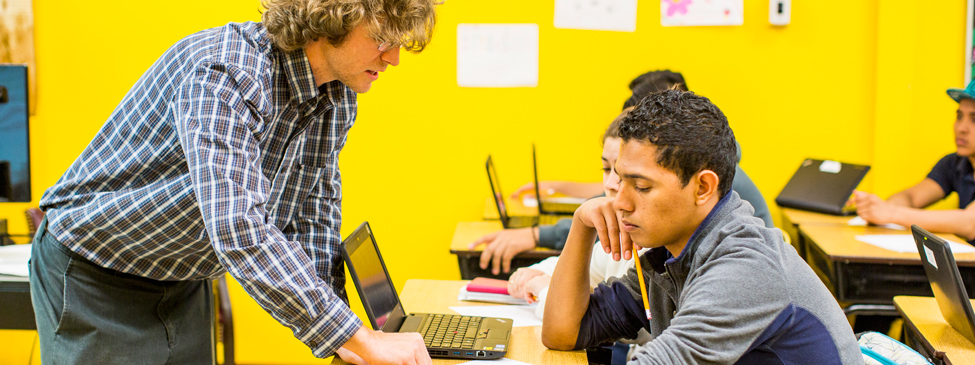Upon arriving on the first day of orientation this year, our new fifth grade students at Excel Academy were given a number to remember: 2027. Before they left school that day, every student in the room knew what it meant: the year they will graduate with a bachelor’s degree.
For 12 years, Excel has educated hundreds of middle school students—the majority are children of first-generation immigrants from Latin America and among the most underserved young people in Boston and Chelsea, Massachusetts. Our students have been stand-outs: our eighth graders have been among the top-performing public middle school students in Massachusetts for the past eight years. Our teachers are pretty great, too.
You would think that graduating from our middle school, students—who consistently out-perform their peers at higher resourced schools on the nation’s most rigorous state exams—would be on the straight path to high school and college success, right? Not quite. Often, our students stumble on obstacles their test scores and GPAs can’t always predict.
Some, like those who are chosen to attend selective private schools, struggle to navigate the nuanced ways race, class, and social status play out in these environments: It’s hard to feel a sense of belonging when the work study in your financial aid package requires you to clean the cafeteria where your friends eat.
For students who attend local public schools, the problems tend to be less about navigating social experiences—though that happens, too—and more about the lack of access to challenging high school content and overstretched support staff who can’t adequately help them map out goals for college or career paths.
After graduating our first few classes of students, we realized that no matter how strong our resources and teachers were during their four years in middle school, the intangibles—knowing how to navigate a world where everyone speaks and looks different than you, or how to advocate for your own needs—continued to be obstacles when they left Excel.
So we formed the Graduate Services Department (GSD): an office of five full-time professionals charged with filling in the gaps where our graduates’ high schools cannot—either because they do not know how to support low-income students of color, or because they don’t have the resources to do so.
The GSD is a place for our graduates to get the support they need as they navigate high school and beyond. This might mean listening to a student talk through an issue around race or class at their new school and helping them figure out how to address it. Many of our students speak to us about what it’s like to experience the stark differences between their neighborhood communities and school communities. Some describe the mental process of shedding their “home self” for their “school persona” every day to feel accepted. Others become masters at never allowing the two worlds to meet.
The symbolic armor they put on to face their new environments is a constant reminder of their otherness, and we don’t shy away from having difficult conversations about how that makes students feel. Even when we can’t provide clear answers, they often tell us they feel validated just by talking about it.
Beyond providing direct support to former students, our team also observes and synthesizes the struggles they face in high school and feed that data back to our middle schools, so teachers and administrators can try to proactively address issues earlier.
Lessons we learned from our graduates shaped the way our eighth grade team adapted their academic curriculum. It also led to the creation of Freshman Academy: a program for eighth graders that seeks to prepare students for critically important, non-academic parts of high school, like making self-directed decisions about their future.
As our first classes of students have matured and become college-aged, so have our strategies for addressing their needs. Our Post-Secondary Support unit was established in 2010 to keep supporting students in colleges where our alumni are enrolled. We provide college and career counseling, financial aid and matriculation advice, and make campus visits.
The fact of the matter is, without support throughout high school and beyond, our alumni are statistically unlikely to complete college: A decade ago, only about 20 percent of Boston Latino students in the high school class of 2005 earned a degree six years after enrolling in college. In contrast, 65 percent of our college alumni are currently on track to complete a two- or four-year degree.
While we wish our persistence numbers more closely mirrored the number of students who receive excellent scores on statewide exams while they’re in middle school, we won’t pretend to have all the answers on how to get there. But our work at the GSD has proven that long-term, holistic support can make a real difference for students—especially those who are academically prepared for high school and college, but need help confronting obstacles they weren’t prepared for.
Yinnette Sano is a Director of Postsecondary Support in Graduate Studies Department at Excel Academy Charter Schools in East Boston, Massachusetts.








